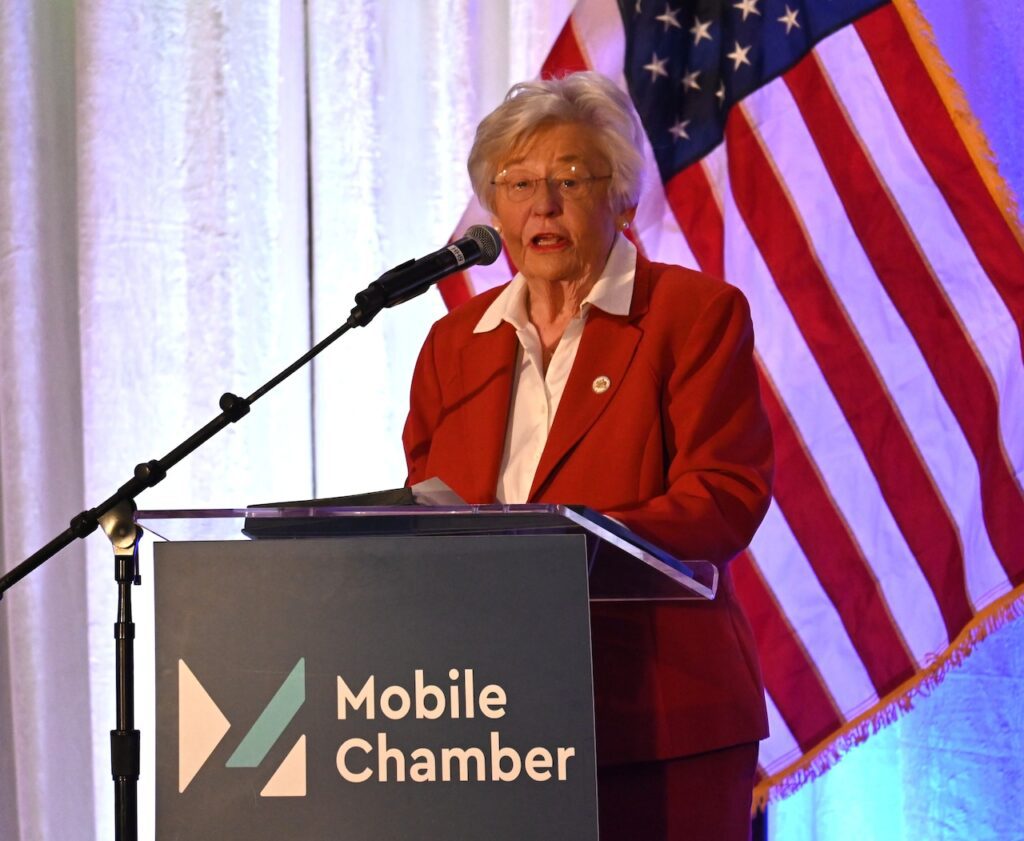Former Alabama Gov. Robert Bentley infamously declared nearly nine years ago that the state’s educational system “sucks,” sparking outrage but also underscoring a truth at the time: Alabama ranked near the bottom nationally in fourth-grade math and reading scores.
Fast forward to Wednesday, when Gov. Kay Ivey touted Alabama’s jump from 52nd to 32nd in fourth-grade mathematics and from 49th to 34th in reading. She made her remarks during a speech hosted by the Mobile Chamber at the Battle House Renaissance Hotel in downtown Mobile.
“This is a remarkable accomplishment considering we ranked near the bottom five years before,” Ivey said.
The National Assessment of Educational Progress (NAEP) results were first announced in February, but Mobile Chamber president and CEO Bradley Byrne said it’s time for communities across the state to recognize the turnaround as they strengthen workforce development efforts.
“We have to dig into that,” Byrne said. “That’s a big part of what we do to sell this area that we have an educated, trained workforce these employers are looking at.”
He continued, “The most important thing that a new industry that comes into a place is looking for is workforce and it’s not just about warm body. It has to be education and talents to do the ever-higher levels of work requirement particularly with A.I. But that much educational progress is a huge asset to us as we sell the Mobile area.”
Alabama’s fourth graders are now scoring near the national average in both reading and math — a sharp improvement from 2019, when the state ranked near the bottom in both subjects.
Alabama has shown more growth in fourth-grade math than any other state since 2019, a fact Ivey highlighted during her remarks. She cited a recent National Review article titled “The Southern Surge in Education,” which spotlighted Alabama’s gains at a time when national fourth grade reading scores reached their lowest point in 20 years.
“Folks are taking notice,” Ivey said about Alabama’s advancements.
That progress has been credited within the past year to investments in early reading and math instruction, retraining teachers in research-based techniques, and adding reading and math coaches in elementary schools.
In fourth-grade math, Alabama students earned an average score of 236 out of 500, a six-point increase since 2002 and the highest score since testing began. Reading scores have remained relatively stable, and the rise in rankings may reflect declining performance in other states.
Alabama still struggles in middle school performance, with eighth graders ranking 46th in reading and 48th in math.
Workforce development
The emphasis on education comes as Alabama and cities like Mobile focus more on workforce development.
Ivey this year launched the new Alabama Department of Workforce Development, appointing former Alabama Senate President Pro Tem Greg Reed to lead the agency. Ivey said it represents her first complete realignment of a cabinet agency in her eight-and-a-half years as governor.
The agency’s mission is to boost Alabama’s workforce participation rate, which stands at 57.8%, among the lowest in the nation, even as unemployment remains at 2.9%.
“Many workers are sitting on the sidelines because of personal barriers in their lives,” Ivey said. “They may live far from training areas and job sites, have not completed high school, and they cannot find (childcare). For a lot of those folks, we have good news in that Alabama is launching a new program of more accessible job training and employment services. This streamlining of worker training is long overdue.”
Byrne said workforce development has been a top priority for the past three years through the Mobile Area Workforce Alliance, a partnership among local schools, colleges, and employers.
He said the Mobile area generated 3,400 new employees in the past year, with more demand coming. Austal USA, a shipbuilder in downtown Mobile, expects to hire 2,000 workers soon.
Byrne also said the city is preparing for a new major maritime industry, which will add pressure to expand warehousing space and workforce training.
Homebuilding academy

Workforce development is also a priority for the City of Mobile. New Mayor Spiro Cheriogotis told reporters after Ivey’s speech that he supports the creation of a homebuilding academy offering free, hands-on training for people seeking careers in residential construction.
Cheriogotis said the city is exploring ways to provide financial support for the program, which begins in January. The academy offers an eight-week construction skills boot camp for anyone 17 or older interested in entering the construction field.
A proposal to finance the program through an increase in permit fees is on hold, Cheriogotis said. He added that the city may consider broader changes to permitting and inspections.
“I don’t want to piecemeal it, but I want to do it in an overarching and thoughtful way,” Cheriogotis said.
Tommy Davis, executive director of the North Alabama Homebuilding Academy and leader of the new South Alabama academy, told the Mobile County Commission on Monday that the Huntsville program has produced more than 700 graduates in six years. About 70% have gone on to work in residential construction.
“If they finish the program, we find them a job in construction,” Davis said. “We are removing another barrier for them.”
If you purchase a product or register for an account through a link on our site, we may receive compensation. By using this site, you consent to our User Agreement and agree that your clicks, interactions, and personal information may be collected, recorded, and/or stored by us and social media and other third-party partners in accordance with our Privacy Policy.

